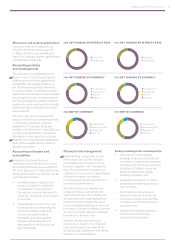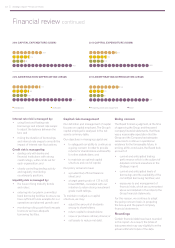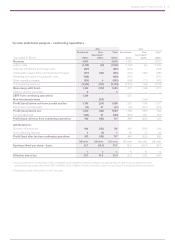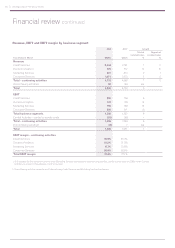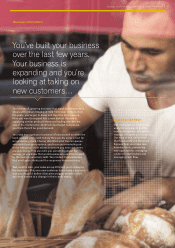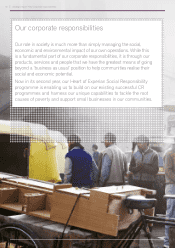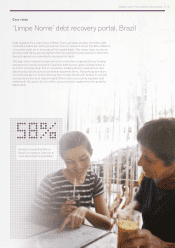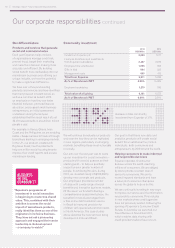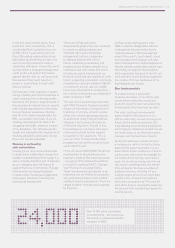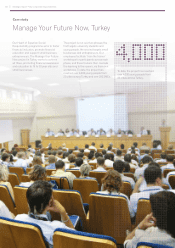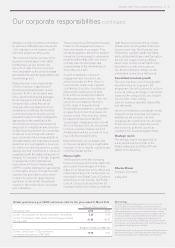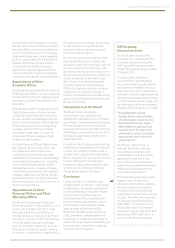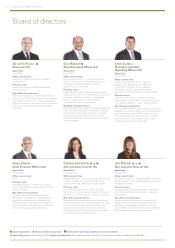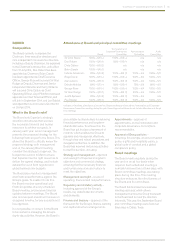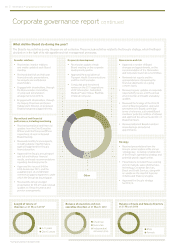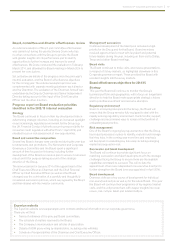Experian 2014 Annual Report Download - page 61
Download and view the complete annual report
Please find page 61 of the 2014 Experian annual report below. You can navigate through the pages in the report by either clicking on the pages listed below, or by using the keyword search tool below to find specific information within the annual report.
In the first three months alone, fraud
prediction rates increased by 14%. It
is estimated that Australians lose over
AUD$1 billion a year due to personal
fraud. By helping organisations share
data about suspected fraud cases, this
service has the potential to make a
substantial difference. Around the world
we help millions of people manage their
credit profile and protect themselves
against identity theft, as well as provide
thousands of free credit reports to
people in need of help through debt
advice charities.
Our business model depends on people
having a healthy and informed attitude to
credit, enabling them to be responsible
borrowers. We produce huge amounts of
free educational material and our experts
make regular appearances in the media
to raise financial awareness. Working
with the UK’s national broadcaster, the
BBC, we created ‘heat maps’ of the UK
showing where people are likely to be
struggling with debts, based on analysis
of our databases. This offered powerful
insight and highlighted the importance of
financial education, particularly among
those who may be vulnerable.
Working in partnership
with communities
Investing in our local communities helps
us build strong relationships and gives us
a better understanding of their needs. It is
also a culturally important part of Experian
as our colleagues value the chance to
support their local communities. Through
these projects we develop teamwork,
increase levels of employee engagement,
and support individuals’ personal and
professional development.
The Heart of Experian Social
Responsibility programme has continued
to inspire our global ambition and
stimulate high levels of employee
engagement, but this is supported
by regional projects with a local
flavour, embracing volunteering and
neighbourhood charities relevant to our
employees’ and local needs. Our aim in
the last year was to increase both our
financial investment and employees’ work
time in supporting sustainable community
programmes. Experian invested US$6.9m
in community activity, and over 24,000
hours were volunteered in working time –
the most since becoming an independent
public company in 2006.
Through our long-standing partnership
with PFEG (Personal Finance Education
Group) we have begun a programme to
transform 21 primary schools in some
of the UK’s most disadvantaged areas,
as pinpointed using Experian’s Mosaic
database, into Centres of Excellence
in financial education. As part of this,
trained Experian volunteers have been
matched to schools to offer support
to teachers in the classroom. This is
just one of the 12 financial education
programmes around the world we have
supported this year.
In the US, we donated 80,000 free annual
memberships to freecreditscore.com –
Experian’s credit profile checking service
– in support of the National Foundation
for Credit Counseling (‘NFCC’) Sharpen
Your Financial Focus programme.
These memberships have started to be
redeemed and are offered to consumers
who seek financial advice from a NFCC-
certified financial professional. This is the
largest donation of its kind ever awarded
by Experian.
In Chile, we are working with a local
NGO, Fundación Banigualdad, who are
creating three training centres to help
small businesses in the most deprived
areas of the country. Local experts, along
with volunteers from Experian, will offer
advice and guidance to help entrepreneurs
develop robust business plans, based upon
which they can apply for micro-loans to
start or grow their business. In the UK, our
work with the Prince’s Trust has supported
the creation of 57 new businesses in the
East Midlands and London.
Our fundamentals
To enable us to be a successful
business and deliver on our aim to help
communities realise their social and
economic potential, we must ensure the
fundamentals of our business are right.
Our most significant environmental
impact relates to the way we run our
offices, particularly our use of energy, our
travel and the waste we generate. Our
long-standing environmental programme,
with employee champions located around
the world, helps us to effectively monitor,
manage and minimise these impacts.
During the latest year we have focused
on energy use, which is driven to a large
extent by the power required to run our
data centres. These centres are critical to
our business and need to be available for
our clients 24 hours a day, seven days a
week. As we reduce energy use, then we
also reduce operating costs and indirect
CO2e emissions. We have a number of
projects underway, including an ‘eco-
cooling’ project at one of our major data
centres in the UK which has reduced
electricity consumption by 11% since the
start of the project, achieved by lessening
the amount of air conditioning needed for
cooling servers.
Over 24,000 hours volunteered
in working time – the most since
becoming an independent public
company in 2006.
57
Strategic report • Our corporate responsibilities


